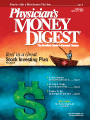12 "Must-Know" Principles for Financial Literacy
Most thoughtful doctorsbegin the month ofJanuary with a "NewYear's resolution." Sadly, manydon't get very far. However, nowmore than ever, when it comes totheir personal finances, it's crucialfor physicians to resolve to live amore organized and disciplined life.
The following 12 "Must-Know" Principles for FinancialLiteracy from the Institute ofConsumer Financial Education canserve as a great foundation forbeginning and maintaining yourroad to financial security:
• Know the amount of yourtake-home pay—Before committingto significant expenditures,estimate how much income is likelyto be available for you. Net income,after all mandatory deductions, ismore important to estimate thangross income before deductions.
• Pay yourself first—Beforepaying bills and other financialobligations, set aside an affordableamount each month in accountsdesignated for long-range goals andunexpected emergencies.
• Start saving young—Recognizethat your total savings aredetermined both by the interest youearn on those savings and the timeperiod over which you save. Thesooner you start saving, the morefunds you will be able to amass inyour nest egg over time.
• Compare interest rates—Obtain rate information from multiplefinancial service firms to getthe best value for your money.
• Don't borrow what youcan't repay—Be a responsible borrowerwho repays as promised,showing you're worthy of gettingcredit in the future. Before you borrow,be sure to compare your totalpayment obligations with incomethat you will have available to makethese payments.
• Budget your money—Createan annual budget to identify expectedincome and expenses, includingsavings. This will serve as a guide tohelp you live within your income.
• Money doubles by the "ruleof 72"—To determine how long itwill take your money to double,divide the interest rate into 72. Forexample, an account earning 6%interest will double in 12 years (72divided by 6 equals 12).
• High returns equal highrisks—Recognize that no one willpay you high rates on a sure thing.In most cases, the higher the interestrate offered to you, the investor,the higher the risk of losing some,or all, of the money you invest.Diversification of assets is the bestprotection against risk.
• Don't expect something fornothing—Be leery of advertisements,salespeople, or other sourcesof financial offers promising anythingfree. Like nonfinancial opportunities,if it sounds too good to betrue, it probably is.
• Map your financial future—Take time to list your financial goals,along with a realistic plan for achievingthem.You can go places you wantto go without a road map—but seldomon the first try.
• Your credit past is yourcredit future—Be aware that creditbureaus maintain credit reports,which record borrowers' histories ofrepaying loans. Negative informationin credit reports can affect yourability to borrow at a later point.
• Stay insured—Purchase insuranceto avoid being wiped out bya financial loss, such as an illness oraccident. An insurance plan shouldbe part of every physician-investor'spersonal financial plan.
Source: Institute of Consumer Financial
Education (619-239-1401; www.icfe.info).
